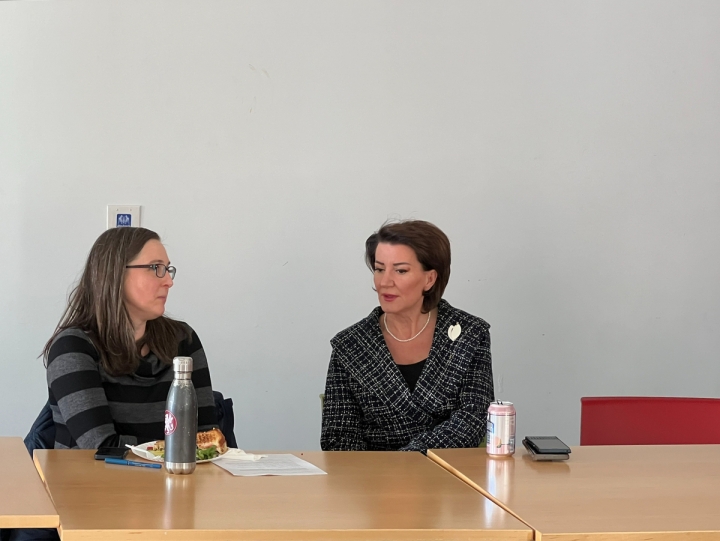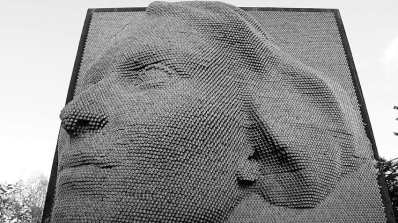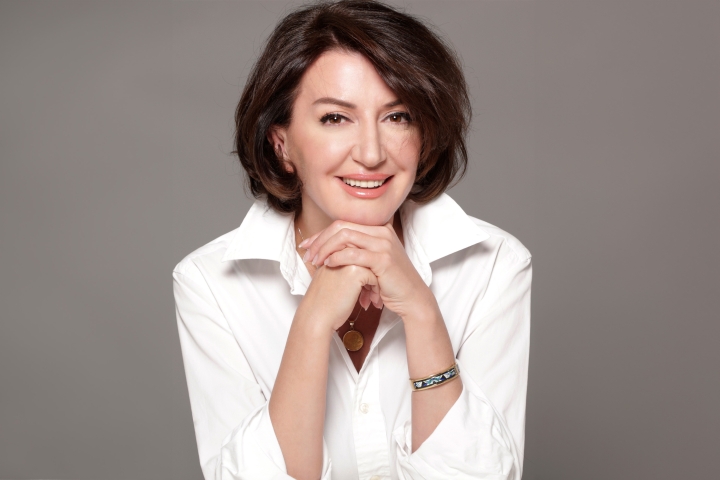When Atifete Jahjaga was elected president of Kosovo in 2011 at age 36, she was not only the youngest leader to assume that office in the country’s history, but also its first female president and the first woman to be a head of state in the Balkans.
In the years that followed, Jahjaga, who held office until 2016, has been recognized both domestically and internationally for her focus on such human rights issues as sexual violence used as a weapon of war and the access of women to economic resources and political power.
Her clarity on these issues emerged out of the wars in the Balkans that followed the dissolution of Yugoslavia after the fall of the Berlin Wall. The conflicts were marked by ethnic cleansing, massacres, and widespread sexual violence. Kosovo declared its independence from Serbia in 2008.
Jahjaga has returned to campus as a Montgomery Fellow during winter term and is teaching a course on War, Nationalism, and Sexual Violence in Southeast Europe in the Program in Women’s, Gender, and Sexuality Studies.
Jahjaga was previously a Montgomery Fellow in 2016 and also gave a speech on campus in 2012 about the challenges of state building in Kosovo.
For a former head of state to come to Dartmouth to engage with students is an enormous opportunity, says Montgomery Fellows Program Director Steve Swayne, the Jacob H. Strauss 1922 Professor of Music.
“Having someone for 10 weeks at a table with students working on whatever the issue is at hand” can have a profound impact, Swayne says. “I felt she would be unique in being able to expand the horizons of our students.”
Jahjaga, a friend and colleague of the late Madeleine Albright, the former secretary of state, has also taught at the Albright Institute at Wellesley College.
As a cofounder of the Jahjaga Foundation in Prishtina, the capital of Kosovo, Annabel Martín, a professor of Spanish, comparative literature, and women’s, gender, and sexuality studies, has seen the breadth of Jahjaga’s engagement with students and peers.
She “makes you feel like you’re a contributor. She’s very straightforward, honest and direct. She brings you into whatever the topic might be, and she makes you understand. Her audience is very wide,” Martín says.

Part of the work of the Jahjaga Foundation, Martín adds, is to talk about masculinity. How can men in Kosovo create different family structures? How can the society develop equality between men and women? How did the war in Kosovo affect men and communities?
Legislative accomplishments during Jahjaga’s presidency included giving health benefits and a pension to women who had survived sexual violence during the war, as well as working on educational and economic opportunities for women, Martín says.
In addition to her class, Jahjaga is having several meetings with students and fellows across campus during winter term, including a lunch discussion with War & Peace Fellows at the John Sloan Dickey Center for International Understanding and meetings next month with Great Issues Fellows and Global Health Fellows.
She also plans to hold a conversation open to the public at 4:30 p.m. on Jan. 31 in Filene Auditorium with Dickey Center Director Victoria K. Holt on “a tale of feminist leadership.”
Jahjaga recently answered questions from Dartmouth News about her work and interest in returning to Dartmouth. Her responses have been lightly edited for length and clarity.
Dartmouth News: Sexual violence as a weapon of war is as old as war itself. Given evidence of the use of sexual violence in the Ukraine-Russian war, the Israel-Hamas war, and other wars and conflicts across the globe, what can be done to eradicate it and prosecute it? Is this actually possible?
Atifete Jahjaga: Unfortunately, sexual violence as a weapon of war remains one of the most evil consequences of any war or conflict, as it inflicts pain that spans beyond the end of the war or conflict in question. It is inflicted on some of the most vulnerable sections of the population, and besides the infliction of pain, it is used to denigrate women—be that mothers, daughters, wives or sisters—and through that leave marks on the nation, and demoralize the people as well.
It is precisely because it is so inhumane that this practice is classified as a crime against humanity and a war crime by the Rome Statute of the International Criminal Court. Despite the efforts to stop this practice, they have proven to be unsuccessful for several reasons: (1) women’s bodies are considered to be a symbol of “morality” and the carriers of the culture and the history through reproduction. As such, one ideological way to violate a nation is through the bodies of women; (2) many states consider sexual violence as an instrument through which they can weaken a country; and (3) it is unfortunately an “efficient” way to leave a country destroyed long after a war or conflict is finished,
It is precisely because of these reasons that it is highly unlikely that we can eradicate this practice. But we can ensure that we prosecute the perpetrators of these practices and give them the harshest punishments, in order to send a message to anyone who even dares to think of committing such despicable acts. It is therefore necessary that all state actors involved in warfare take certain measures against perpetrators of such acts, by punishing the perpetrators within their ranks and discouraging such practices.
It is important that a more holistic approach is taken into consideration as a preventive measure, whereas harsh punishments are given in the cases when the acts of rape have already taken place. And here, it is important that we do not show mercy in the aftermath of the rape, as it will only weaken our ability to prevent similar cases in the future. Unfortunately, the culture of impunity towards the perpetrators of sexual violence is a practice in every war-torn country. However, each stakeholder of the state needs to mobilize in order not to leave such crimes unpunished.
DN: What have you learned in your efforts to mobilize public opinion against sexual violence used as a tool of war?
AJ: Although I have been working with victims of sexual violence during the war in Kosovo throughout my mandate and after leaving office, it still is not an easy topic to discuss and mobilize people around, given that it opens wounds that are still fresh. There are a lot of cases of women who have been victims of rape during wartime who haven’t told anyone yet. Whereas there are husbands, fathers, brothers, and sons who are in denial and do not wish to talk about what their wives, daughters, sisters, and mothers have endured.
It is therefore one of the more difficult topics to mobilize the public opinion around. It is very rarely the case that women talk of their experiences as rape victims, because of the feeling of shame they have—as if they asked for this to happen to them.
It saddens me that they live with this burden, without being able to share their true feelings, whereas they spend the rest of their lives feeling guilty of a crime they didn’t commit. What makes matters worse is that the perpetrators are rarely held accountable for their acts of violence.
One important lesson I have learned in my battle for justice for the victims of rape during wartime is that we need to focus just as much attention to the rest of the family of the victim as we do with the victims. Their main source of comfort—their family, their household—needs to understand that in the occurrence of such an aggression, the victim is a survivor who needs empathy and rehabilitation.
And survivors need to have all the support they can get to overcome their pain, while focusing on finding justice and punishment for the perpetrators.
DN: It’s not unusual in wartime for people on all sides–politicians, journalists, leaders—to downplay rape as a weapon of war. How can politicians, world leaders, and journalists deal forthrightly with this issue without politicizing it?
AJ: Victims of rape, regardless of sex and ethnicity, need support, whereas the perpetrators of such acts need to be punished. Only when we begin to think of each victim as a human can we begin to solve the matter. The moment we begin to attach tags to the victims, be that sex, ethnicity, citizenship, religion, or race, we begin to create opportunities for politicization of this issue, depending on the side of the conflict we support.
Therefore, it is important that when we speak of the victims, we speak of them simply as human beings who have been violated and who need both treatment and justice. A human who has been violated in any shape or form is in the end a human, despite the intersection of identities they carry when being labeled with a specific ethnicity, race, or religion.
DN: You have been to Dartmouth before. What to you is the value of teaching? What distinguishes the Montgomery Fellowship from other such fellowships or residencies you
have had—if indeed there is a distinction?
AJ: Teaching offers a unique opportunity to share knowledge and experience with a group of young people who have the passion but sometimes lack the experience. To me, it is really important to bring new perspectives to students, to share my own lived experiences with them, and to show them that whatever is discussed in classrooms isn’t just blank theory; it is something that has been experienced by someone, and could tomorrow be experienced by them as well.
Despite the fact that it sounds like a cliché, students and youths truly are the future, hence I love working with them in helping them shape their identities and making them aware of the limitless nature of life.
DN: What are the subjects that you are including in your course at Dartmouth?
AJ: The syllabus of this course delves into the complex relationship between gender, nationhood, and conflict, with a specific focus on Kosovo. Over the course of 10 weeks, students will explore various themes, including feminist nationalism, motherhood and nationhood, the impact of war on the female body, sexualized violence during conflict, and the role of women in postwar recovery.
The syllabus incorporates a mix of readings from scholars like Benedict Anderson, Nira Yuval-Davis, and Cynthia Enloe, as well as guest speakers and film screenings, providing a multifaceted perspective on the subject. Students will have the opportunity to engage deeply with these topics and develop their own insights into the complex interplay of gender, nationhood, and conflict.
DN: When you speak to young women in Kosovo and internationally about the work you have done, there must be common threads or concerns that they talk about, regardless of nationality. What are some of those common threads?
AJ: I’ve observed a recurring pattern of self-doubt among women, regardless of their backgrounds. It’s a troubling trend rooted in the pervasive presence of patriarchy, which has historically undermined women’s confidence. Yet I firmly believe that women are not only capable of achieving anything men can but often excel even further. This conviction fuels my mission to empower women wherever I go, reminding them that their capacity to bring life into the world is a testament to their ability to lead nations, command armies, and succeed in any endeavor.
Another challenge I frequently encounter is women’s reluctance to apply for positions unless they feel fully competent, unlike men who often apply even if they don’t meet all the criteria. It’s crucial for us to collectively work on boosting the confidence of girls and women, encouraging them to seize opportunities and challenge the status quo.
Moreover, there’s a prevailing belief that women don’t support each other, viewing fellow women as threats. While there’s some truth to this historically, it’s rooted in the scarcity of women in leadership roles. As women have traditionally been underrepresented in such positions, those who do reach the top may perceive other women as threats to their hard-won positions. This dynamic is a structural issue that will take time to change but is likely to evolve as we address the aforementioned challenges.
I urge the women in our audience not to hesitate when it comes to pursuing positions of influence, even if you feel you don’t meet every requirement. After all, it appears that such reservations don’t hinder men! Let’s also remember the importance of solidarity among women. In the wise words of Madeleine Albright, “there’s a special place in hell for women who do not help other women.”
I also implore everyone not to shy away from speaking out against injustice, irrespective of the identities of the victim or the perpetrator. Crime remains crime, regardless of the perpetrator’s affiliation, and a victim deserves justice, regardless of their background. It is incumbent upon all of us to stand up for what is right, even when it is uncomfortable or inconvenient.

